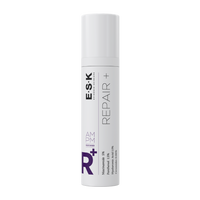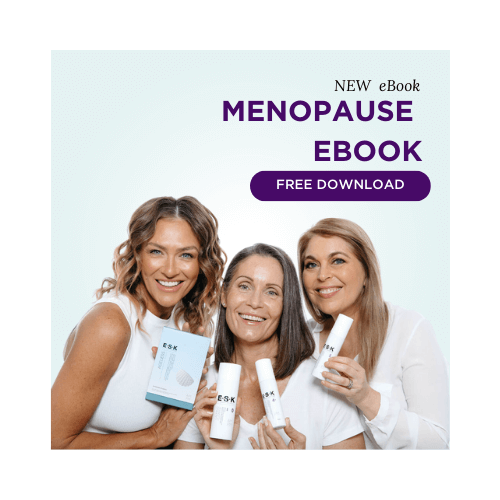
Science Hub
July 2025 Science Wrap Up
23 July 2025
Dr Ginni Mansberg
Hello!! This month’s science wrap is coming to you from boiling Los Angeles where we are hard at work doing some photo shoots….With Selma Blair! It’s been something I’ve been bursting to tell you about, our partnership with Selma and her investment in ESK has seen us shuttling to and from the US over the past 6 months. It’s finally happening. An announcement about our partnership went live this week on Sunrise. Stay tuned for some collaborative products – you will hear it here first!! Between filming and photo shoots and finishing off my next book (1 month to deadline!!!) I have been super frenzied! But I can’t keep away from my beloved journals! Here are a few studies that caught my eye:
Sensitive skin? It turns out your ceramide levels are probably off!
A new study offers one of the most detailed peeks yet into what’s actually going on in sensitive skin, particularly on the face. It looked at 66 healthy Japanese women aged 20–49, with 48 of them having sensitive skin (based on how they felt and how their skin reacted to a lactic acid test). The researchers found that people with sensitive skin don’t necessarily have drier skin or more redness, (in fact many had completely normal looking skin) but their skin barrier is subtly off. Specifically, they had lower levels of key ceramides, the fat molecules that help hold the skin barrier together. One particular ratio — CER[NP]/CER[NS] was lower in those with sensitive skin, and that drop correlated with more skin stinging, less mature skin cells, and more disorganised packing of lipids or fats into the skin barrier. There was also a whisper of chronic low-level inflammation potentially driving these changes. And – interestingly, a higher skin cell turnover rate. This meant some skin cells were prematurely being asked to sit in the top layers of the skin before they’re mature enough to handle the normal onslaught of skin cells. Now we have to work out how to address this using skincare!
Repair + is a moisturiser formulated to support skin hydration and barrier function. Its combination of niacinamide, panthenol, hyaluronic acid, and ceramides is designed to help maintain skin moisture, strengthen the barrier function of the skin, reduce the appearance of redness, and support overall skin texture. Key Features:
Repair +
Misinformation around hyperpigmentation
A new US study in the Journal of Drugs in Dermatology looked at how hyperpigmentation affects peoples’ lives. A survey of 150 mostly women and people with skin of colour, revealed that there is a world of misunderstanding about hyperpigmentation.
Nearly 41% had never tried any treatment, and of those who did, only 25% were satisfied. Of those who did try something, their expectations were amiss! Most expected fast results – in between one to four weeks. Yet we know that hyperpigmentation treatments often take months to really help. This is exactly what we see from comments on our socials. Barriers to getting help included cost, uncertainty about what products to use, and fear of ongoing treatment. Internet and social media were the most common (and potentially misleading) sources of information.
Participants who successfully treated their hyperpigmentation anticipated a strong positive impact on self-esteem. However, only a small fraction felt well-informed or satisfied with current treatments. The authors highlight the need for better patient education, realistic expectation-setting, and emphasised the critical importance of sun protection. Especially for people with skin of colour.
On Accutane for acne? What do dermatologists suggest you do next?
A new US based survey published in the Journal of Drugs in Dermatology dives into what dermatologists actually do after a patient finishes isotretinoin (aka Roaccutane), and the results? Let’s just say, there’s a lot of variation. Even though acne relapses after isotretinoin are super common (anywhere from 20 to 60% of people flare up again), there are no official guidelines on what to do next.
The dermatologists who responded to the survey don’t agree on the best daily dose of isotretinoin, and they even differ on how long to keep people on treatment. Most will stop isotretinoin two months after the acne clears, and many start maintenance treatments right away, usually topical retinoids, especially for guys. But shockingly, one-third of dermatologists don’t routinely offer any maintenance at all.
When acne comes back, women are more likely to be prescribed spironolactone, while men are often given a second round of isotretinoin. This lack of consistency has experts calling for a proper consensus or guidelines to help standardise care and reduce the frustrating cycle of relapse.
Battling dryness from Isotretinoin, the acne-fighting champion? Our new Isotretinoin Companion Skincare Kit is here to save the day! Packed with evidence-based ingredients like panthenol, ceramides, and niacinamide, it’s designed to calm and hydrate your skin. We know Isotretinoin can be tough on your skin barrier, but our kit promises to rebuild and strengthen it, reducing side effects and keeping blemishes at bay. Say goodbye to redness, stinging, and dryness, and hello to a balanced, clear complexion. We've got your back, all the way to flawless skin!
Isotretinoin Companion Kit
Featuring;
- Deeply hydrating products
- Blemish busters
- Mighty skin barrier builders
- Gentle, non-irritating products
Plus take a look at Selma Blair's daily essentials!
Our Repair + for gentle restoration and Ultimate A for powerful anti-aging without irritation, the perfect combination for sensitive skin that refuses to compromise on results.

